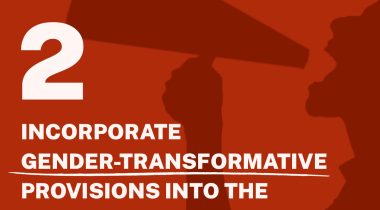
Liz Nelson ■ Economic reforms and austerity: A ‘wicked problem’ impacting on women

In March 2017 the UN Human Rights Council adopted a resolution mandating the United Nations Expert on Foreign Debt and Human Rights Mr. Juan Pablo Bohoslavsky to consider the effects of foreign debt and other related international financial obligations of States on the full enjoyment of all human rights, particularly economic, social and cultural rights. We were especially pleased that he sought to extend his inquiry to understand the impact of economic reforms and austerity measures on the human rights of women.
The purpose of the UN resolution more broadly, set out last year, was to extend the mandate and request the UN Expert to pay attention to:
(a) The effects of foreign debt and the policies adopted to address them on the full enjoyment of all human rights, economic, social and cultural rights;
(b) The impact of foreign debt and other related international financial obligations on the capacity of States to design and implement their policies and programmes, including national budgets that respond to vital requirements for the promotion of the realization of social rights;
(c) Measures taken by Governments, the private sector and international financial institutions to alleviate such effects in developing countries, especially the poorest and heavily indebted countries;
(d) New developments in, and actions and initiatives being taken by international financial institutions, other United Nations bodies and intergovernmental and nongovernmental organizations with respect to economic reform policies and human rights;
(e) The effects of public debt, economic reform and financial consolidation policies on the realization of the Sustainable Development Goals;
(f) The impact of illicit financial flows on the enjoyment of human rights;
(g) The process entrusted with the follow-up to the International Conference on Financing for Development, with a view to bringing to its attention the issue of the effects of structural adjustment and foreign debt on the enjoyment of human rights, particularly economic, social and cultural rights;
(h) Enhancement of consultations with all relevant stakeholders in the fulfilment of the mandate;
You can find the full text of the UN Council’s resolution here.
The Tax Justice Network along with several other civil society organisations, governments and academic and multilateral institutions prepared submissions which can be reviewed on the UN website here.
Our submission set out two distinct consequences of illicit financial flows. First, that women, positioned as they are socio-economically as carers and ‘gap- fillers’ for austerity-weakened services, are disproportionately impacted by unfettered cross jurisdictional illicit financial flows. And second, that the haemorrhaging of domestic revenue resources which could otherwise provide public services, social protection and economic development for women and their dependents is an inevitable consequence of at best ‘turning a blind eye’ to corrupt and legal practices; and at worst a political drive to line the pockets of elites, and prevent the rebalancing and redistribution of income and wealth.
We have long made financial transparency the cornerstone of our governance and accountability policy design. As the UN Expert begins to consider the ‘wicked problem’ that is illicit financial flows as part of his enhanced mandate, we advocate three key policies be incorporated as a starting point in the international effort to de-legitimise and expose tax avoidance, evasion, corrupt financial practices and their enablers, which we refer to as the ABCs of tax transparency:
Automatic Multilateral Exchange of Information. TJN advocates for a global, comprehensive system of exchange.
Beneficial ownership: public registers of the real owners of companies trusts and foundations, available for free in open data format
Country by Country Reporting, publicly by multinational companies
(The Tax Justice Network’s Alex Cobham gives a talk on the rise of our core policy platform – the ABCs of tax transparency here).
The financial transparency offered in these ABC policies affords governments a ‘nowhere-to-hide’ response to tax dodging and corruption. It empowers Governments to meet their human rights obligations and to realise the full rights of citizens. Most saliently, they would allow women to take an equal place in a society that’s structured for equal opportunity.
If it continues unchecked, the current trajectory of economic reforms and orthodox austerity policies threatens deeper global fragility, increasingly denying women their human rights.
Related articles
The elephant in the room of business & human rights
UN submission: Tax justice and the financing of children’s right to education
14 July 2025
One-page policy briefs: ABC policy reforms and human rights in the UN tax convention
Tax justice pays dividends – fair corporate taxation grows jobs, shrinks inequality
UN Submission: A Roadmap for Eradicating Poverty Beyond Growth
A human rights economy: what it is and why we need it

Do it like a tax haven: deny 24,000 children an education to send 2 to school

Incorporate Gender-Transformative Provisions into the UN Tax Convention
Just Transition and Human Rights: Response to the call for input by the Office of the UN High Commissioner for Human Rights
13 January 2025


